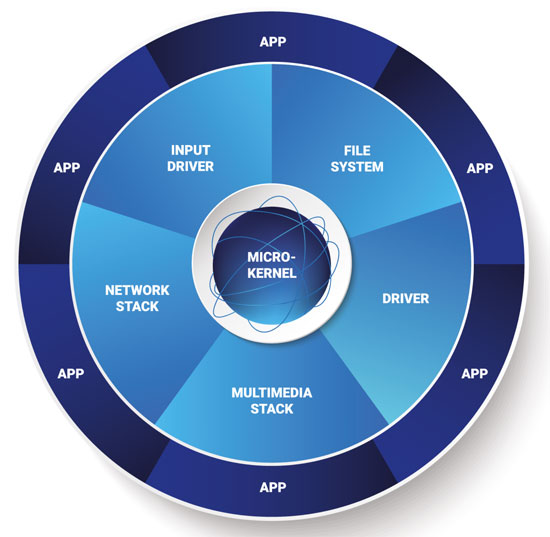QNX Neutrino RTOS 7.1

The QNX Neutrino RTOS offers the performance and reliability needed by today’s embedded systems. Since 1980, thousands of companies have relied on this fully featured RTOS for applications ranging from advanced medical devices, to driver-assistance systems, to industrial robotics and train control systems.

The QNX Neutrino RTOS microkernel architecture and layered security isolates critical processes, protecting them from interference, whether accidental, bugs in other components or deliberate attacks. Systems built on this RTOS can run almost indefinitely—as long as the hardware lasts.
- Spatial isolation of OS from drivers and applicaions
- Fine grained fault isolation
and recovery - Message passing design for modular, well formed systems
- Comprehensive multi-core support
- Asymmetric(AMP), symmetric (SMP) and bound multiprocessing (BMP)
- Guard pages at the end of each virtual stack to protect against stack overflow
POSIX Compliance
- Validation using PSE 54 test suite
- Supports a broad range of POSIX API specifications
Deterministic Performance
- Pre-emptive scheduler with choice of schduling methods
- Destributed priority inheritance
Adaptive Partitioning
- Redistribute unused cycles to optimize CPU loading
- Guarantee CPU cycles to critical processes without compromising system performance
High Availability
- Heartbeat for early fault detection
- High availability manager (HAM) to restart failed or unresponsive processes and services
- Intelligent restart and transparent reconnection
Protected Direct Memory Access (DMA)
- IOMMU/SMMU Manager leverages x86 VT-d or Arm® SMMU derivatives to protect against unauthorized DMA
- Configurable boundaries for access to bus devices
- Boundary oblation monitoring and management
Processor Support
- 64-bit support for the latest ARMv8 and x86-64 SoCs
- Continued 32-bit support for ARMv7 SoCs
- WiFi 802.11 a/b/g/n
- Full IPv4 and IP56 stack
- USB 3.x, host, device and on-the-go (OTG)
- PCIe
- Integrations with eAVB, TSN, SOME/IP, RTPS, DBUS, DDS
- Support for network applications, including NFS, SSH, DHCP and DNS
Layered Security
- Granular control of system privilege levels
- Self-verifying filesystems with AES 256 encryption
- Secure system activity logging
- Heap, stack and memory protection
- Rootless execution
- Secure boot implementing TPM and TrustZone
File Systems
- Image file system (IFS), RAM, Flash, QNX6 Power-Safe, ON% Trusted Disk, Compressed
- UDF, NVMe, HFS+, Linux, DOS, CD-ROM, CIFS, NFS and NTFS
Graphics and HMI Technologies
- Screen composition manager supporting multiple graphics technologies
- Single, unified interface from multiple UI sources
- Leverages GPU acceleration and supports multi-touch input and video capture
Instrumented Microkernel
- System-wide performance analysis and optimization
- Rapid detection of timing conflicts, hidden faults, etc.
Support and Documentation
- Architecture overviews
- Programming and configuration guides
- Complete API references
- Board Support Packages

